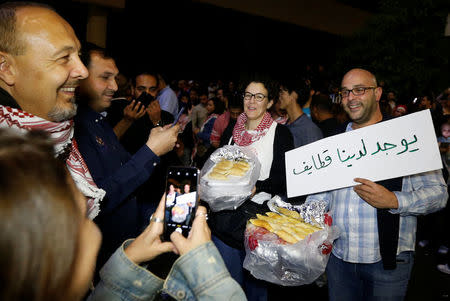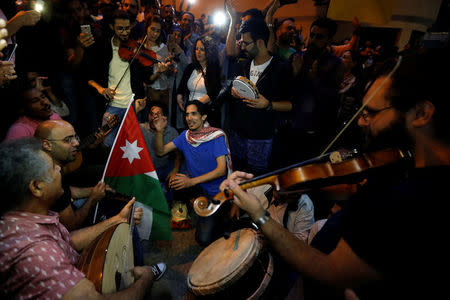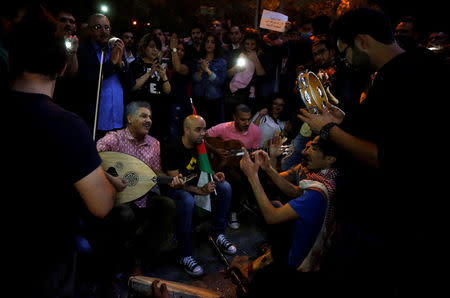Young Jordanians taste political protest for the first time
By Ellen Francis
AMMAN (Reuters) - Jordanian accountant Leen Samer has never attended a protest in Amman before.
But since last week, she and her friends have flocked to rallies near the cabinet office every night to join the country's largest protests in years.
"I feel like something is changing," she said after midnight on Tuesday, with hundreds of people around her chanting "government of thieves" and waving flags.
"There's no going back," the 24-year-old said. "Young people are very excited, and if anything from now on we're not going to be silent."
A draft law to raise income taxes, part of reforms backed by the International Monetary Fund, has brought thousands onto the streets in Amman and other parts of Jordan. Public anger has been building since a steep rise in the general sales tax and the end of bread subsidies earlier this year.
For many of the protesters, it is their first taste of political dissent in a country where tight security has largely succeeded in keeping unrest at bay.
The protesters - many of them students, recent graduates and young workers - complain of struggling to pay their bills, find jobs, or build a future in Jordan's sluggish economy, and say the government's policies have only made things worse. They also accuse politicians of squandering public funds and corruption.
In interviews with Reuters, these twenty-somethings recalled their teenage years watching the "Arab Spring" uprisings of 2011 from which Jordan escaped relatively unscathed.
Islamists, tribal leaders, and leftist parties spearheaded most of the demonstrations in Jordan at the time.
Now, activists say the protests have brought new faces: unprecedented, large crowds of young professionals, middle class families and students without political experience.
The rallies have snowballed since unions first called them last week. While they were unlikely to cause the major upheavals of the Arab Spring, many young Jordanians say they show that they are more politically aware than other generations and are prepared to continue to mobilise.
"We used to always watch others protesting on TV," said Ahmad Awad, a 22-year-old university student. "But praise God, we've achieved something good."
Ali al-Abous, head of the Professional Unions Association which declared the first walkout, said the protests pointed to growing political awareness among the youth, who he believed would be more active in the future.
"They are expressing themselves," he said. "Life has changed, and people became more interested in politics."
The country last saw domestic unrest in 2012, when the IMF told the government to lift gasoline prices.
"I HAVE NOTHING"
Jordan has navigated years of instability at its borders, including wars in Iraq and Syria and conflict in the Israeli-occupied West Bank. It also hosts close to 700,000 Syrian refugees.
The regional crisis has hit the economy of the Arab nation already poor in resources. Jordan's unemployment rate stands at 18.4 percent, according to government statistics.
The latest tax reforms are part of a three-year plan negotiated between Jordan and the IMF in 2016 to lower the country's $37 billion debt and encourage structural change.
The government argues the reforms will reduce social disparities by placing a heavier burden on high earners.
King Abdullah, widely seen as a unifying force, on Monday accepted the resignation of Hani Mulki as prime minister and appointed Harvard-educated Omar al-Razzaz, calling for broad talks in an attempt to defuse public anger.
The move did not stop nearly 2,000 people rallying late into the night, however. Some celebrated Mulki's resignation, and others vowed to stop protesting only after the government rescinds the tax bill it sent to parliament last month.
Police said on Monday the protests remained under control, though officers have detained 60 people in recent days.
For many at the rally, the problems would not end with just a change in leadership.
"Maybe the government thought the resignation would make the youth go home," said Awad. "But we are protesting here for a better future, for our parents who are paying...for changing the approach of the government."
Samer said her parents discouraged her from joining the late night protests on the first day but now supported her. She came home to live with her family in Amman after getting a degree in the United States, but now barely makes enough to fill the car tank and buy groceries.
"I grew up here," she said. "I'd like to see change happening here, I don't want to have to leave."
Abdallah al-Khalili, 24, said the latest tax plan is just the last straw.
"The government has honestly bankrupted us," the hotel employee said. "I have nothing, I get a salary and spend it all because of the cost of living."
He too worried the economic problems would push people abroad. "We love the king and our country, but the government's policies got us here, the corruption."
(Writing by Ellen Francis; editing by Sonya Hepinstall)




